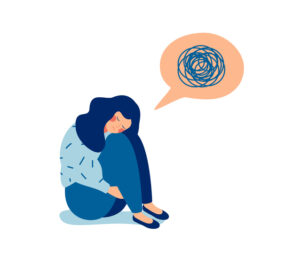Dealing with Grief: Understanding the Stages and Finding Support
Grief is a universal experience that accompanies loss, yet its manifestations and effects are deeply personal. Whether stemming from the death of a loved one, the end of a relationship, or another significant life change, grief can disrupt every facet of our lives.
The Stages of Grief
One of the most widely recognized frameworks for understanding grief is the five stages proposed by Elisabeth Kübler-Ross (1969): denial, anger, bargaining, depression, and
acceptance. While these stages provide a helpful lens, it is essential to understand that grief is not a linear process; individuals may oscillate between stages or experience them in a different
order (Corr, 2019).
- Denial: This initial stage often serves as a buffer, helping individuals process the shock of loss gradually. It can manifest as numbness or disbelief.
- Anger: Feelings of frustration and helplessness may emerge as individuals grapple with the reality of their loss. Anger may be directed at oneself, others, or even the deceased (Worden, 2018).
- Bargaining: This stage is characterized by “what if” and “if only” thoughts, as individuals attempt to regain a sense of control or postpone the pain.
- Depression: As the reality of the loss sets in, feelings of sadness and hopelessness may become pronounced. This stage is often the most challenging but also a natural part of the grieving process.
- Acceptance: Acceptance does not mean being “okay” with the loss but involves reaching a point where individuals can acknowledge the reality and begin to move forward.
While these stages are widely discussed, recent research underscores the importance of recognizing the individuality of grief. Bonanno et al. (2019) emphasize that resilience plays a crucial role in how individuals navigate their grieving process, and not everyone follows the traditional model.
Strategies for Coping with Grief
Grieving is a deeply personal journey, and there is no “right” way to grieve. However, adopting certain strategies can help individuals navigate their feelings and begin to heal:
- Allow Yourself to Feel: Suppressing emotions can prolong the grieving process. Acknowledging and expressing feelings—whether through talking, writing, or creative
outlets—can be cathartic (Stroebe & Schut, 2010). - Establish Routines: Loss often disrupts daily life. Re-establishing routines, even in small ways, can create a sense of stability and normalcy.
- Seek Support: Sharing your feelings with trusted friends, family, or support groups can alleviate feelings of isolation. Professional counselling can also provide tailored coping strategies (Neimeyer, 2015).
- Prioritize Self-Care: Physical health influences emotional well-being. Regular exercise, proper nutrition, and sufficient sleep can help bolster resilience.
- Honor the Loss: Finding meaningful ways to remember a loved one, such as creating a memorial or participating in activities they enjoyed, can provide solace and a sense of connection.
Finding Support
Navigating grief alone can be overwhelming. Fortunately, numerous resources are available to help individuals through this challenging time:
- Support Groups: Community-based or online grief support groups provide a space to connect with others who have experienced similar losses.
- Therapy: Professionals specializing in grief and bereavement can offer individualized strategies for coping. Approaches such as grief counseling and cognitive-behavioral therapy (CBT) have shown effectiveness in mitigating prolonged grief symptoms (Bryant et al., 2014, Shear et al., 2005).
- Crisis Helplines: For immediate emotional support, crisis helplines (https://www.healthdirect.gov.au/mental-health-helplines) are available
Author: Linh Nguyen, B. Psychology (Hons), M. ClinPsych
Linh is a Registered Psychologist at Vision and M1 Psychology. Her educational background includes a Bachelor of Psychological Science (Hons), and she has completed her Postgraduate Master’s Degree in Clinical Psychology.
To make an appointment with Linh Nguyen try Online Booking. Alternatively, you can call M1 Psychology Loganholme on (07) 3067 9129.
References
Bonanno, G. A. (2019). The other side of sadness: What the new science of bereavement tells us about life after loss. Hachette UK.
Bryant, R. A., Kenny, L., Joscelyne, A., Rawson, N., Maccallum, F., Cahill, C., … & Nickerson, A. (2014). Treating prolonged grief disorder: a randomized clinical trial. JAMA psychiatry, 71(12),
1332-1339. doi:10.1001/jamapsychiatry.2014.1600
Corr, C. A. (2019). Death, dying, life, and living (8th ed.). Cengage Learning.
Kübler-Ross, E. (1969). On death and dying. Macmillan.
Neimeyer, R. A. (2015). Techniques of grief therapy: Assessment and intervention. Routledge.
Shear, M. K., Frank, E., Houck, P. R., & Reynolds, C. F. (2005). Treatment of complicated grief: A randomized controlled trial. JAMA, 293(21), 2601-2608. doi: 10.1001/jama.293.21.2601.
Stroebe, M., & Schut, H. (2010). The dual process model of coping with bereavement: A decade on. OMEGA-Journal of Death and Dying, 61(4), 273-289. doi: 10.2190/OM.61.4.b
Worden, J. W. (2018). Grief counseling and grief therapy: A handbook for the mental health practitioner (5th ed.). Springer Publishing Company. https://doi.org/10.1891/9780826134752


